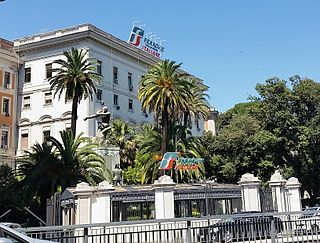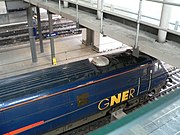
The railway system in Great Britain is the oldest railway system in the world. The first locomotive-hauled public railway opened in 1825, which was followed by an era of rapid expansion. Most of the track is managed by Network Rail, which in 2017 had a network of 15,811 kilometres (9,824 mi) of standard-gauge lines, of which 5,374 kilometres (3,339 mi) were electrified. These lines range from single to quadruple track or more. In addition, some cities have separate metro, light rail and tram systems. There are also many private railways, which are primarily short lines for tourists. The main rail network is connected with that of continental Europe by the Channel Tunnel and High Speed 1, which fully opened in 1994 and 2007 respectively.

Network Rail Limited is the owner and infrastructure manager of most of the railway network in Great Britain. Network Rail is an "arm's length" public body of the Department for Transport with no shareholders, which reinvests its income in the railways.

Great North Eastern Railway, often referred to as GNER, was a train operating company in the United Kingdom, owned by Sea Containers, that operated the InterCity East Coast franchise on the East Coast Main Line between London, Yorkshire, North East England and Scotland from April 1996 until December 2007.

United Kingdom labour law regulates the relations between workers, employers and trade unions. People at work in the UK can rely upon a minimum charter of employment rights, which are found in Acts of Parliament, Regulations, common law and equity. This includes the right to a minimum wage of £9.50 for over-23-year-olds from April 2022 under the National Minimum Wage Act 1998. The Working Time Regulations 1998 give the right to 28 days paid holidays, breaks from work, and attempt to limit long working hours. The Employment Rights Act 1996 gives the right to leave for child care, and the right to request flexible working patterns. The Pensions Act 2008 gives the right to be automatically enrolled in a basic occupational pension, whose funds must be protected according to the Pensions Act 1995.
The privatisation of British Rail was the process by which ownership and operation of the railways of Great Britain passed from government control into private hands. Begun in 1994, it had been completed by 1997. The deregulation of the industry was initiated by EU Directive 91/440 in 1991, which aimed to create a more efficient rail network by creating greater competition.

The Hatfield rail crash was a railway accident on 17 October 2000, at Hatfield, Hertfordshire. It was caused by a metal fatigue-induced derailment, killing four people and injuring more than 70.

Rete Ferroviaria Italiana (RFI) is the Italian railway infrastructure manager, subsidiary of Ferrovie dello Stato (FS), a state-owned holding company. RFI is the owner of Italy's railway network, it provides signalling, maintenance and other services for the railway network. It also operates train ferries between the Italian Peninsula and Sicily. RFI's origins can be traced back to a series of railway sector reforms enacted by the Italian government during the late 1980s and 1990s. The agency was founded on 1 July 2001 in accordance with a European directive on rail transport that mandated the separation of the infrastructure operator and the service operators. Prior to RFI's creation, the Italian rail network was managed directly by FS. The agency has been periodically accused to a failure to be impartial, including allegations of favouring sibling company Trenitalia over independent operations; the company has been fined in the past for anti-trust breaches. Since its creation, revenue abstraction from access charges have steadily increased, primarily due to the expansion of Italy's high-speed rail network, even as access charges have been decreased.

The Anti-Social Behaviour Act 2003 (c.38) is an Act of the Parliament of the United Kingdom which almost entirely applies only to England and Wales. The Act, championed by then Home Secretary, David Blunkett, was passed in 2003. As well as strengthening the anti-social behaviour order and Fixed Penalty Notice provisions, and banning spray paint sales to people under the age of 16, it gives local councils the power to order the removal of graffiti from private property.

Human rights in the United Kingdom concern the fundamental rights in law of every person in the United Kingdom. An integral part of the UK constitution, human rights derive from common law, from statutes such as Magna Carta, the Bill of Rights 1689 and the Human Rights Act 1998, from membership of the Council of Europe, and from international law.

The Office of Rail and Road (ORR) is a non-ministerial government department responsible for the economic and safety regulation of Britain's railways, and the economic monitoring of National Highways.

Grand Central is an open-access train operating company in the United Kingdom. Presently a subsidiary of Arriva UK Trains, it has operated passenger rail services since December 2007.

The Health and Safety at Work etc. Act 1974 is an Act of the Parliament of the United Kingdom that as of 2011 defines the fundamental structure and authority for the encouragement, regulation and enforcement of workplace health, safety and welfare within the United Kingdom.
United Kingdom employment equality law is a body of law which legislates against prejudice-based actions in the workplace. As an integral part of UK labour law it is unlawful to discriminate against a person because they have one of the "protected characteristics", which are, age, disability, gender reassignment, marriage and civil partnership, race, religion or belief, sex, pregnancy and maternity, and sexual orientation. The primary legislation is the Equality Act 2010, which outlaws discrimination in access to education, public services, private goods and services, transport or premises in addition to employment. This follows three major European Union Directives, and is supplement by other Acts like the Protection from Harassment Act 1997. Furthermore, discrimination on the grounds of work status, as a part-time worker, fixed term employee, agency worker or union membership is banned as a result of a combination of statutory instruments and the Trade Union and Labour Relations (Consolidation) Act 1992, again following European law. Disputes are typically resolved in the workplace in consultation with an employer or trade union, or with advice from a solicitor, ACAS or the Citizens Advice Bureau a claim may be brought in an employment tribunal. The Equality Act 2006 established the Equality and Human Rights Commission, a body designed to strengthen enforcement of equality laws.

The Equality Act 2010 is an Act of Parliament of the United Kingdom passed during the Brown ministry with the primary purpose of consolidating, updating and supplementing the numerous prior Acts and Regulations, that formed the basis of anti-discrimination law in mostly England, Scotland and Wales; some sections also apply to Northern Ireland. These consisted, primarily, of the Equal Pay Act 1970, the Sex Discrimination Act 1975, the Race Relations Act 1976, the Disability Discrimination Act 1995 and three major statutory instruments protecting discrimination in employment on grounds of religion or belief, sexual orientation and age.

Office of Fair Trading v Abbey National plc and Others[2009] UKSC 6is a judicial decision of the United Kingdom Supreme Court relating to bank charges in the United Kingdom, with reference to the situation where a bank account holder goes into unplanned overdraft.

United Kingdom insolvency law regulates companies in the United Kingdom which are unable to repay their debts. While UK bankruptcy law concerns the rules for natural persons, the term insolvency is generally used for companies formed under the Companies Act 2006. "Insolvency" means being unable to pay debts. Since the Cork Report of 1982, the modern policy of UK insolvency law has been to attempt to rescue a company that is in difficulty, to minimise losses and fairly distribute the burdens between the community, employees, creditors and other stakeholders that result from enterprise failure. If a company cannot be saved it is "liquidated", so that the assets are sold off to repay creditors according to their priority. The main sources of law include the Insolvency Act 1986, the Insolvency Rules 1986, the Company Directors Disqualification Act 1986, the Employment Rights Act 1996 Part XII, the Insolvency Regulation (EC) 1346/2000 and case law. Numerous other Acts, statutory instruments and cases relating to labour, banking, property and conflicts of laws also shape the subject.

The Factories Act 1961 is an Act of the Parliament of the United Kingdom. At the time of its passage, the Act consolidated much legislation on workplace health, safety and welfare in Great Britain. Though as of 2008 some of it remains in force, it has largely been superseded by the Health and Safety at Work etc. Act 1974 and regulations made under it.

United Kingdom enterprise law concerns the ownership and regulation of organisations producing goods and services in the UK, European and international economy. Private enterprises are usually incorporated under the Companies Act 2006, regulated by company law, competition law, and insolvency law, while almost one third of the workforce and half of the UK economy is in enterprises subject to special regulation. Enterprise law mediates the rights and duties of investors, workers, consumers and the public to ensure efficient production, and deliver services that UK and international law sees as universal human rights. Labour, company, competition and insolvency law create general rights for stakeholders, and set a basic framework for enterprise governance, but rules of governance, competition and insolvency are altered in specific enterprises to uphold the public interest, as well as civil and social rights. Universities and schools have traditionally been publicly established, and socially regulated, to ensure universal education. The National Health Service was set up in 1946 to provide everyone with free health care, regardless of class or income, paid for by progressive taxation. The UK government controls monetary policy and regulates private banking through the publicly owned Bank of England, to complement its fiscal policy. Taxation and spending composes nearly half of total economic activity, but this has diminished since 1979.
The Single European Railway Directive 20122012/34/EU is an EU Directive that regulates railway networks in European Union law. This recast the "First Railway Directive" or "Package" from 1991, and allows open access operations on railway lines by companies other than those that own the rail infrastructure. The legislation was extended by further directives to include cross border transit of freight.

The third railway package is a collection of European Union legislation, intended to revitalise railways across Europe and open up passenger services to competition.













